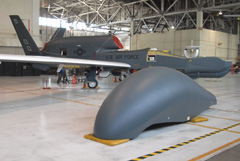
| Global Hawk Block
30 Arrives at Edwards for ASIP Testing |
|
|
1/4/2008 - EDWARDS AIR FORCE BASE, CA. -- The 452nd Flight Test Squadron here is scheduled to begin a series of developmental flight tests on the RQ-4 Global Hawk Block 30 in February. The aircraft arrived in Edwards on a ferry flight Nov. 16 from the Northrop Grumman Palmdale, CA facility. The unmanned Block 30 aircraft carries the Airborne Signals Intelligence Payload (ASIP) that will increase battlefield signal collection capabilities. "Our developmental testing will determine how well the ASIP will collect data and locate radio frequency emitters in the battlefield," said Steve Salas, 452nd Flight Test Squadron ASIP Project Manager. The ASIP is a system of systems that specializes in identifying various emitters, he said. "The payload's capabilities are extremely important for situational awareness and intelligence gathering across huge areas of land," Mr. Salas said. Testing during 2008 will include four phases -- ground testing, calibration testing, performance flight testing and operational assessment. "Ground testing ensures all connections are well-functional," Mr. Salas said. During the calibration testing phase, the testers will fly the Global Hawk to calibrate the antennas and hardware, such as adjustments of antenna position, cable lengths and configurations, he said. Testers must also ensure the data collected is accurate. The performance testing phase is "the meat of our testing," Mr. Salas said. "Here, we measure the payload's performance against its specifications." Testers will measure how well the operators can accomplish the mission in the final operational testing phase. "Even though the ASIP is tested in a laboratory, it works differently out in the field," Mr. Salas said. External factors, including electromagnetic interference and thermal effects, might affect the performance of the aircraft. This will be the first time the ASIP is tested with other sensor systems, he said. "The ASIP will be a huge advancement in intelligence gathering," Mr. Salas said. "The Block 30 aircraft will allow the Air Force to gather and process data from 60,000 feet on a 35-hour flight mission from a variety of sources." The Block 30 basically is the same aircraft as the Block 20, said Bob Giffin, 452nd FLTS Block 30 deputy project manager. However, Block 30s are configured to carry ASIP with associated antennas and cabling. The ASIP-collected data will be integrated into Air Force-distributed common ground stations that integrate and analyze electronic intelligence from various airborne systems. "We are very excited to receive the Block 30 aircraft," Mr. Giffin said. "We can now start the installation of the ASIP payload and perform about a year of extensive flight testing." Source: USAF Press Release by Senior Airman Julius Delos Reyes |
| |
